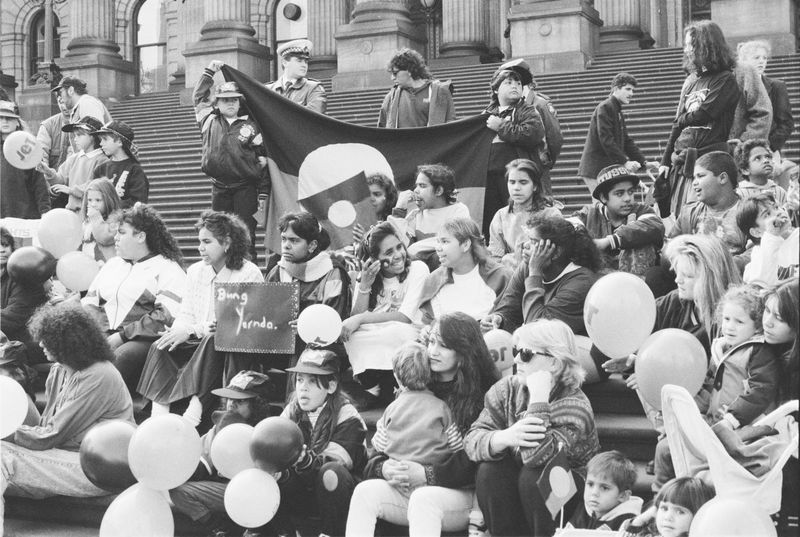But Not Enough Change
Aboriginal and Torres Strait Islander people have been fighting for self-determination for many years. While there have been some gains, there is still some way to go as Indi Clarke articulates.
Children and parents on steps of Parliament House
"[W]henever I see these old... black and white photos of mob sitting up, back in the day at Parliament... It's pride in the community for standing up and standing strong, but it's also the sad reality of we're still fighting for a lot of the same things that we were fighting for back then. And... the calls for justice still haven't been heard."
"We're definitely not stuck ‘cause there's a lot of things that have happened. But... due to who's in power at the time is depending on how they'll listen. I think in terms of societal changes we're seeing it because... you go to any march this year, or any march anytime nowadays, and as I said there's a lot more non-Aboriginal and Torres Strait Islander people walking with us and... sitting there screaming out. And... calling for justice just as much as the Blackfellas are there. So I think definitely there's been changes in people's awareness and consciousness. But... whilst there're changes sometimes they’ve only been incremental or slow. Whereas if we think about when those photos were taken, it was in 1992, '93. And that's when the Royal Commission into Aboriginal Deaths in Custody was handed down. And yet Aboriginal people are still over-represented in justice at... staggering rates. Although that Royal Commission painted a very... stark picture of where our country's treatment of Aboriginal and Torres Strait Islander people was, to this day we are way too over-represented. And... those changes need to be made today and tomorrow."
"[S]o if we remember where NAIDOC came from, it came from a protest, and it came from Aboriginal and Torres Strait Islander people calling for better treatment as people. And NAIDOC week itself came from a day of protest. And so in reality we shouldn't be having to march to demand better rights and... greater representation and.... equal human rights and justice. The reality is that... we would just see in... 20 years time, equity."
"Good things have happened, but at the same time, a lot of my mob are still struggling. A lot of my mob are just surviving. A lot of us are just surviving."
"[F]or me the biggest challenge is access... The reality is access for Aboriginal and Torres Strait Islander people, is limited to an extent. We've seen so many new policies and so many new kinds of agreements and ways of working with people that it sometimes has created more barriers to... the ability to access programs and for communities to be able to deliver programs. I also think that one of the biggest issues is... access to education, access to stable health, access to... all of those things. And to fair and just treatment. Too many of our young people are locked up in youth prisons."
Indi Clarke (6 December 2020)
